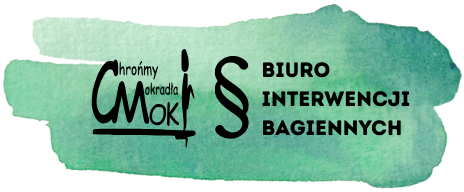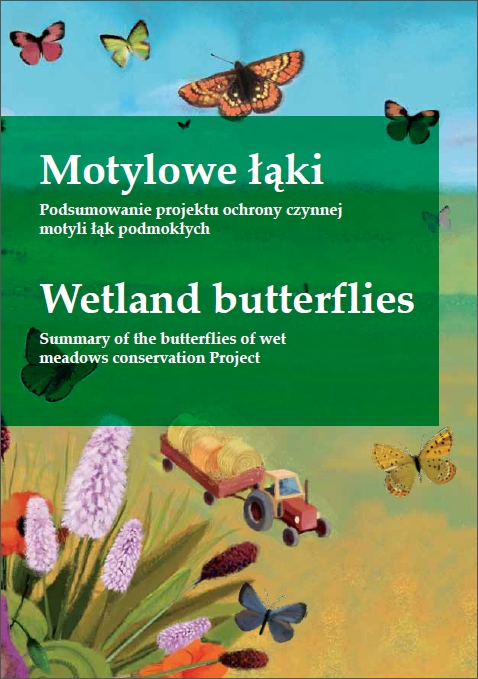
 Bagna.pl
Informacyjny Serwis Mokradłowy
Bagna.pl
Informacyjny Serwis Mokradłowy
Członek założyciel
Wetlands International European Association
Kliknij tutaj, aby powrócić do polskiej wersji strony ![]()
PROJECTS IN PROGRESS
Wetland Interventions Office
As the Wetland Interventions Office, we conduct interventions in case of destruction of protected species and valuable natural habitats reported by the Association’s employees working in the field. We also support individuals and local communities in their interventions to protect endangered wetlands.
The aim of the project is to increase the effectiveness of social nature conservation, improve the response to threats to wetlands and strengthen civic activity. The office will allow us to support more people and places that are currently beyond our reach. We believe that this will help citizens have a real influence on administrative decisions, enforce existing law, and build a stronger rule of law culture and environmental responsibility.
The first 7 months (November 2025 - May 2026) of the Office's operation is possible thanks to the project Wetland Interventions Office - systemic and intervention support for the protection of wetlands in Poland. The initiative is supported by the EFC Foundation as part of the Ludwika and Henryk Wujec Civic Fund.
The Office's continued operation after the grant ends will be only possible thanks to contributions from Donors within the 1.5% tax and regular donations from Patrons through our Patronite account.
LIFE SUPER EU - Scaling Up Peatland Restoration in EUrope
The LIFE SUPER EU project was designed to address the problems limiting the scale of peatland restoration in Europe and has unique catalytic potential. Together with partners, we will restore peatlands in seven EU countries over an area of 1,285 hectares, which will avoid emissions of 12,496 tonnes of CO₂ equivalent per year. We will build organizational capacity to implement large-scale restoration projects and diversify their financing sources. We will develop new peatland restoration projects in 15 European countries and create a 14,600-hectare project portfolio that will be offered to the private sector for financing. In this way, we will contribute to reducing the risk of insufficient initial investment in restoration by sharing costs between public and private sources.
Within the project we will restore 300 hectares of peatlands near Lake Łuknajno in Poland to avoid emissions of around 3,000 tonnes of CO₂ equivalent per year and we will evaluate over 100 other locations, creating a basis for their restoration in the future.
Naturschutzbund Deutschland (NABU) is the project coordinator. The Wetlands Conservation Centre is one of 8 project partners from 7 countries (Germany, the Netherlands, Latvia, Belgium, Ireland, Poland and Lithuania). The project coordinator at Wetlands Conservation Centre is Julian Rudziński (Ten adres pocztowy jest chroniony przed spamowaniem. Aby go zobaczyć, konieczne jest włączenie w przeglądarce obsługi JavaScript.).
The project is financed by EU funds from the LIFE programme.
Project implementation date: September 2025 - August 2030.
Forests for Wetlands – Protection of Hydrogenic Habitats in Environmentally Valuable Areas
The Wetlands Conservation Centre is a social partner in the project “Forests for Wetlands”, coordinated by the Coordination Centre of Environmental Projects. This project provides remarkable opportunities for collaboration with forest districts from all 17 Regional Directorates of State Forests.
The goal of the project is to restore or maintain the ecological functions of bogs, peatlands, and other wetland areas managed by the State Forests across Poland. Our main task is to support the State Forests in planning conservation activities within individual forest districts and to monitor the effects of the implemented measures. The actual conservation actions will be carried out by the respective forest districts.
Additionally, we are responsible for educational activities, including workshops with field sessions and webinars for employees of the participating forest districts. These workshops are organized under the name Hydro Academy.
The project is financed by the European Funds for Infrastructure, Climate, Environment 2021–2027 program.
Project duration: October 2024 – June 2029.
More about CMok’s activities in the project
Comprehensive project for the adaptation of forests and forestry to climate change – small retention and counteracting water erosion in lowland areas – continuation (MRN3)
The Wetlands Conservation Centre is a partner in the project coordinated by the Coordination Centre of Environmental Projects, informally referred to as “Lowland Small Retention.” The project involves forest districts from all 17 Regional Directorates of State Forests, allowing for the implementation of large-scale actions.
The project aims to strengthen the resilience of lowland forest ecosystems to climate change-related threats by implementing measures that ensure water retention. As part of the project, we support forest districts in selecting locations and types of actions to enable both effective water retention and the protection of nature – valuable habitats and species found in the area.
Additionally, the Wetlands Conservation Centre will carry out educational activities presenting good practices and opportunities for wetland conservation in forests. The target group for these activities consists mainly of foresters.
The project is financed under the European Funds for Infrastructure, Climate, Environment 2021–2027 program.
Project duration: July 2024 – December 2028.
More about CMok’s activities in the project
Comprehensive project for the adaptation of forests and forestry to climate change – small retention and counteracting water erosion in mountain areas – continuation (MRG3)
The Wetlands Conservation Centre is a social partner in the project coordinated by the Coordination Centre of Environmental Projects, informally referred to as “Mountain Small Retention.” The project involves forest districts from four Regional Directorates of State Forests (Katowice, Kraków, Krosno, Wrocław).
The project aims to strengthen the resilience of mountain forest ecosystems to climate change-related threats by implementing measures that ensure water retention. As part of the project, we will support forest districts in selecting locations and types of actions so that retention measures also enable the protection of wetland areas rather than conflict with their conservation.
Additionally, the Wetlands Conservation Centre will carry out educational activities presenting good practices and opportunities for wetland conservation in forests. The target group for these activities consists mainly of foresters.
The project is financed under the European Funds for Infrastructure, Climate, Environment 2021–2027 (FENIKS) program.
Project implementation period: July 2024 – December 2028.
More about CMok’s activities in the project
PaluWise - Paludiculture Demonstrations providing multi-actor approaches and recommendations towards large-scale deployment in the EU
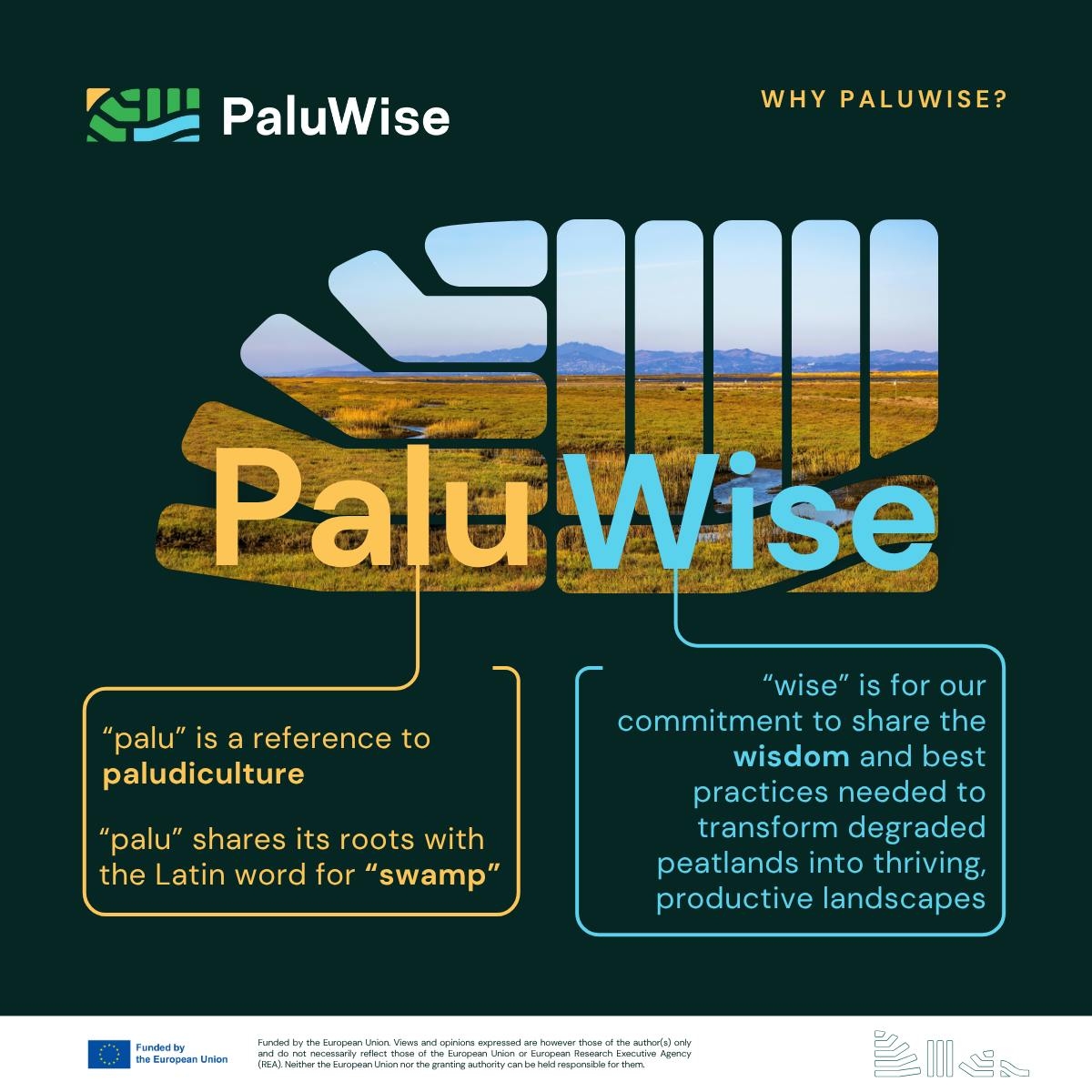 The goal of PaluWise is the development of advanced solutions for farmers wishing to cultivate rewetted peatlands (i.e. implement paludiculture), to fulfill EU climate policy as well as nature restoration efforts.
The goal of PaluWise is the development of advanced solutions for farmers wishing to cultivate rewetted peatlands (i.e. implement paludiculture), to fulfill EU climate policy as well as nature restoration efforts.
Through four large-scale demonstration sites in Europe, PaluWise will demonstrate and validate best practices in paludiculture, transforming degraded organic soils into water-rich, life-rich and agriculturally productive landscapes.
Koordynowane przez Natural Resources Institute Finland (Luke), konsorcjum PaluWise zrzesza 18 partnerów z ośmiu krajów europejskich (Polski, Finlandii, Holandii, Niemiec, Wielkiej Brytanii, Irlandii, Litwy i Łotwy). Projekt będzie realizowany przez 4,5 roku w latach 2025-2029 i otrzymał ponad 10 milionów euro dofinansowania z programu Horizon Europe. Instytucją finansującą jest Europejska Agencja Wykonawcza ds. Badań Naukowych (REA).
Coordinated by the Natural Resources Institute Finland (Luke), the PaluWise consortium brings together 18 partners from eight European countries (Poland, Finland, the Netherlands, Germany, the United Kingdom, Ireland, Lithuania, and Latvia). The project has received over €10 million in funding from the Horizon Europe program. The funding agency is the European Research Executive Agency (REA).
Project realisation: February 2025 – July 2028.
Press release for the launch of the project
PaluWise on social media: Facebook, LinkedIn, YouTube.
WaterLANDS - Natural carbon stores for climate, people, and nature
The largest consortium of wetland protection organizations with funding from the program Horizon 2020 European Green Deal. The project aims to restore European wetlands on a large scale.
The Wetlands Conservation Centre and the University of Warsaw are the only Polish partners in the 5-year, international WaterLANDS project. The project leader is University College Dublin (UCD) from Ireland, while the partners (a total of 31 partner organisations from 14 European countries) represent the research, industry, government, and non-profit sectors.
The Polish part of the project will focus on collecting experience from peatland restoration projects in Mazovia and North-Eastern Poland. The Wetlands Conservation Centre will deal with the ecological and social conditions for restoring wetland ecosystem services, and the Faculty of Economic Sciences of the University of Warsaw will undertake their quantification and valuation.
Project realisation: December 2021 – November 2026.
Press release for the launch of the project
WaterLANDS on social media: Twitter, LinkedIn, YouTube, Instagram.
FINALISED PROJECTS
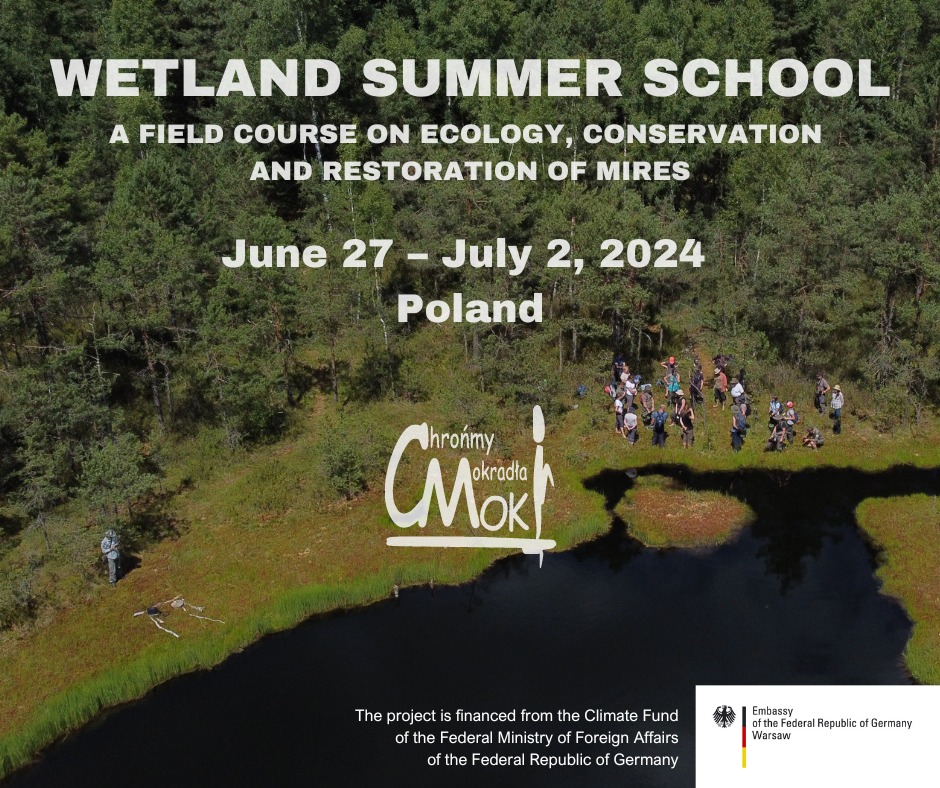 International Wetland Summer School 2024 - field training
International Wetland Summer School 2024 - field training
The aim of this educational project, briefly called the International Wetland Summer School, was to network scientists and practitioners from various European countries, enabling the exchange of knowledge, experiences, and points of view, which should facilitate and accelerate cooperation for the protection and restoration ofwetlands in Poland and other countries as well as at the regional level.
The training took the form of a 7-day field trip from June 26 to July 2, 2024. We invited 25 people to participate in the project, who are practitioners and scientists involved in the protection and restoration of peatlands, who have (or may have in the future) a significant impact on the condition of these ecosystems.
The project was financed by the Climate Fund of the Federal Republic of Germany, represented by the Federal Foreign Office, acting through the Embassy of the Federal Republic of Germany in Warsaw.
Project realisation: May - November 2024.
“Wetland Protection and Restoration Summer School” - field training
The aim of this educational project, briefly called the Wetland Summer School, was to increase the number of field specialists in the field of peatland conservation and restoration practice and planning. The training took the form of a 7-day field trip from 10 to 16 July 2023. We invited 21 people working in non-governmental organizations and public administration, who deal with nature conservation practice and planning on a daily basis, to participate in the project.
The project was financed by the Climate Fund of the Federal Republic of Germany, represented by the Federal Foreign Office, acting through the Embassy of the Federal Republic of Germany in Warsaw.
Project realisation: May - November 2023.
Let's Remember the Wetlands
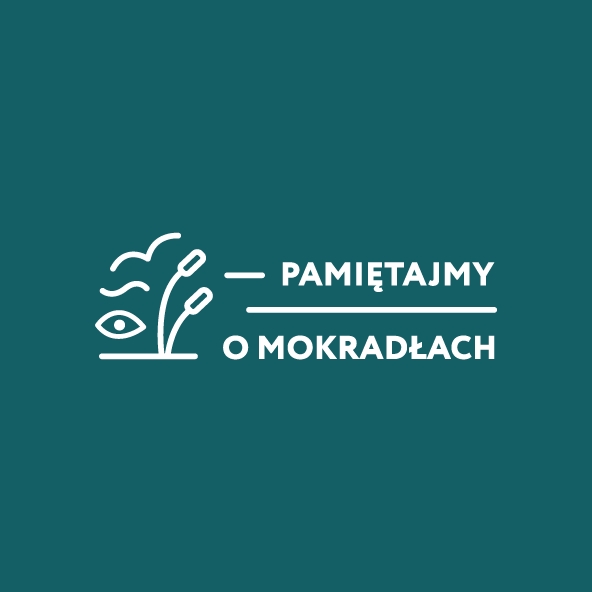 This project involves (re)creating the social identity of wetlands, rebuilding the relationships of residents with their local wetlands, and then jointly planning and carrying out activities for their protection. As part of the project, we are cooperating with selected Guardians of local wetlands from all over Poland, who contacted us during the recruitment process, asking for support in 'taking care' of their wetlands. We will work using ethnographic, visual-narrative, and participatory methods, we will create documentary stories about each of the places. We will provide substantive support, assessing the condition of habitats and organizing educational meetings. We will also try to provide the tools needed to effectively protect these ecosystems or solve existing problems/conflicts (e.g., legal, administrative, mediation), selected during the participatory process in the community. We will document these activities and treat them as model examples that will expand the open map of Polish wetlands ‘under care’.
This project involves (re)creating the social identity of wetlands, rebuilding the relationships of residents with their local wetlands, and then jointly planning and carrying out activities for their protection. As part of the project, we are cooperating with selected Guardians of local wetlands from all over Poland, who contacted us during the recruitment process, asking for support in 'taking care' of their wetlands. We will work using ethnographic, visual-narrative, and participatory methods, we will create documentary stories about each of the places. We will provide substantive support, assessing the condition of habitats and organizing educational meetings. We will also try to provide the tools needed to effectively protect these ecosystems or solve existing problems/conflicts (e.g., legal, administrative, mediation), selected during the participatory process in the community. We will document these activities and treat them as model examples that will expand the open map of Polish wetlands ‘under care’.
This project was implemented with financial support from the Active Citizen Program - National Fund, financed by EEA Funds.
Project realisation: January 2021 - March 2023.
Public control over river ecosystem management in Poland
The main objective of this project is to control the implementation of hydrotechnical works on streams, as well as to find and develop solutions on how to carry out necessary maintenance in accordance with environmental protection needs.
The project is part of the Citizens for Democracy program and supported and financed by the European Economic Area, the Stefan Batory Foundation, and the Polish Children and Youth Foundation.
Project realisation: April 2014 - September 2015.
Active protection of endangered natural habitats in nature reserves in Mazovia and Podlasie
The aim of the project is to protect four endangered natural habitats in Poland and the European Union: Xerothermic grasslands (6210), raised bogs (7110), transitional bogs (7140) and luminous oak forests (91I0). The project is co-financed in 85% by the European Union under the Infrastructure and Environment Operational Programme, in 10% by the National Fund for Environmental Protection and Water Management and in 5% by the Association's own contribution.
Project realisation: February 2013 - May 2015.
Alkaline fen conservation programs (7230) and the associated endangered species: Saxifraga hirculus, Liparis loeselii, Herminium monorchis, and Stellaria crassifolia
The main objective of the project was to develop and publish national conservation programs for alkaline fens and the four endangered plant species found within this habitat (Saxifraga hirculus, Liparis loeselii, Herminium monorchis, and Stellaria crassifolia). To this end, a national database of the habitat and species was created, and regional programs for their active conservation were developed.
The project was implemented between 2008 and 2011 by the Naturalists' Club and the Wetland Conservation Center, and co-financed by the EU's Infrastructure and Environment Operational Programme.
Butterfly meadows - protection and improvement of the habitat quality of rare butterflies of wet semi-natural meadows
The aim of the project "Butterfly meadows" was to ensure the best possible condition and improve the quality of habitats of target butterfly species (Phengaris telejus, Phengaris nausithous, Lycaena helle, Lycaena dispar, and Euphydryas aurinia) and to ensure active protection and implementation of agri-environmental programmes supported by the European Union in NATURA 2000 areas, with particular emphasis on the requirements of target species.
The project was carried out from August 2006 to the end of March 2010 in four Natura 2000 areas: Kampinos Forest (PLC140001), Całowanie Bagno (PLH140001), Chełm Torfowiska (PLH060023), and Sobowice Torfowisko (PLH060024).
Project partners: Regional Ecological Centre (REC), Wetlands Conservation Centre (CMok), It Fryske Gea, Chełm Landscape Parks Board, Mazowiecki Landscape Park, Kampinos Landscape Park, Institute for Land Reclamation and Grassland (IMUZ).
Financing: European Union Financial Instrument LIFE – Nature, EkoFundusz Foundation, GEF Small Grants Program (SGP GEF), and our partners' own funds.
Educational project “Ecology of peatlands and nature conservation of wetlands”
In 2004, the Association implemented an educational project for children from primary schools in the vicinity of the Całowanie Bagno in Mazovia. In the first stage of the project - lessons on the nature of peat bogs in schools, 26 schools took part, we conducted 93 lessons, in which a total of 2298 students took part. Each student taking part in the lessons received one copy of the booklet "Peat bogs viewed up close, or what interesting things are hiding in my area", which we developed especially for the needs of the project. The most active and interested students from each school covered by the project were invited to participate in field lessons, conducted in May in the Całowanie Bagno and the transitional forest peat bogs of the Mazovian Landscape Park. A Wetland Knowledge Contest was announced in all schools covered by the project. From among 83 works submitted to the contest, we selected 66 finalists, who in the second stage of the contest could demonstrate the knowledge they had gained during the project. After summarizing the results of the first and second stages, 31 competition winners were selected and invited to an educational camp in the Biebrza National Park.
Project realisation: January - December 2004.
